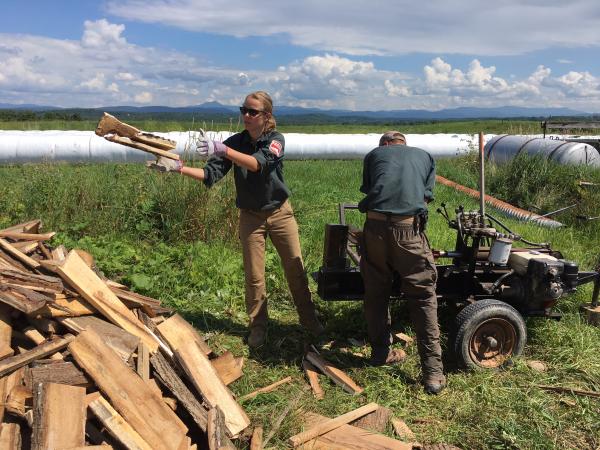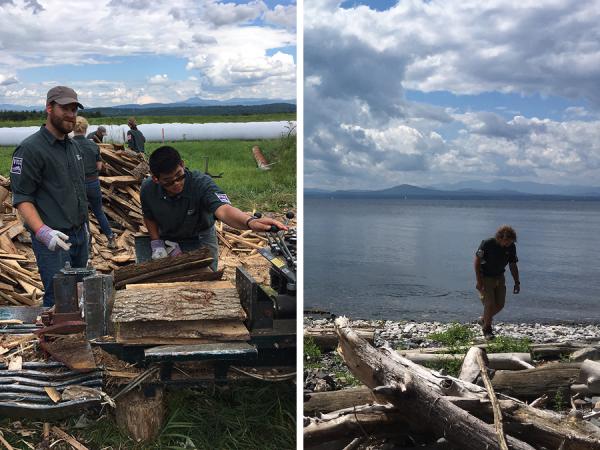VYCC Farm Crew Lends a Hand
You may have seen Vermont Youth Conservation Corps members when summitting a Green Mountain peak, attending an event at Richmond's West Monitor Barn, or helping with recovery efforts after Tropical Storm Irene. They are strong young people who stand out because of their dark green button down shirts and bright woven patches that declare their affiliation with VYCC and the particular programs within it. Cohorts of VYCC youth have been stewarding Vermont land and participating in leadership development programs since 1986, though the program model dates back to the 1930s with its origins in the Civilian Conservation Corps. Like the CCC, VYCC programs provide powerful professional and personal development and paying jobs, while inspiring an appreciation for the environment, community, and teamwork.
Along with VYCC's steadfast efforts to maintain public lands and state parks, they operate an organic vegetable farm in Richmond and have embarked on a cutting-edge hunger relief initiative called Health Care Shares. VYCC members raise vegetables, eggs and poultry on their farm, and glean excess crops from other farms. They assemble food boxes resembling CSA shares, and distribute these to 400 food insecure families and patients through the Central Vermont Medical Center. If that's not an inspiring solution to our state's problem of food insecurity, I don't know what is!
On August 8, members of the VYCC Venture Semester (a gap year program) visited Shelburne Farms for a tour and work-and-learn project. These students drew parallels between Shelburne Farms and the farms they had visited previously. They noted the pros and cons of Farr Farm's robotic milker. They talked about Meeting Place Pasture's custom grazing operation, and the supply of organic beef that Mountain Meadows Farm in Sudbury provides to Whole Foods Markets throughout New England. All of these experiences are shaping their understandings of regional food systems and their roles in it as consumers or growers.
Who we met:
- Phil grew up getting on and off the school bus at the restaurant where his mom was a chef/owner in Connecticut. When she said, 'hey, have you ever wanted to learn where your food comes from beyond the kitchen?' He said, 'sure', and the rest is history.
- Charlotte was very familiar with Shelburne Farms' turf having grown up in Shelburne and spending time with her childhood friend, Georgia Dixon at the dairy. 'I have a lot of options,' she said, 'and I'm just trying to figure out what I want to do.'
- Andrew sat down on a log and stated immediately, "I'm a sweaty guy to start with, I don't want to be out there working non-stop. I've already learned I don't want to be a farmer."
Our day was full, to say the least. We weeded blueberries on Southern Acres with Lynn Wolfe and worked with Dana Bishop and Marshall Webb to split and sort slabwood which is on its way to the sugarhouse. We sat in the shade of Dudley's Woods to assemble the 'Rocks to Cheese' story in a spiral and discussed the inputs and outputs of each step. Tom Perry shared the magic of microbes and we had no problem devouring a pound and a half of cheddar while learning about the cheese enterprise. We took lunch on dock beach with Marshall, and heard bits of Shelburne Farms' history. The "Big Idea" of Interdependence stuck with us throughout the day as we talked about our farm systems, as well as the partnerships we have with community organizations and other businesses in the supply chain.
Aside from bumping around the Farm's roads in the big VYCC van with Talking Heads blasting, my highlight of the day was a quick but deep silence that ensued after Marshall answered one person’s question of how long it took to build an organization like this. Marshall's response was simple, "Many people have worked their whole lives to make this place what it is today," he said. For a moment, I could hear wonder as this fact, and the possibilities it conjured, took root within these young adults.



